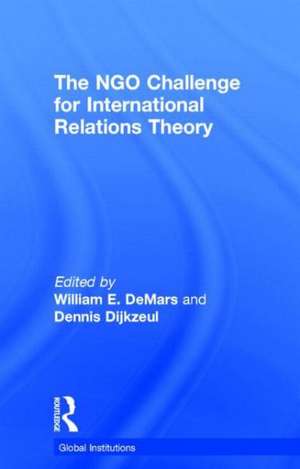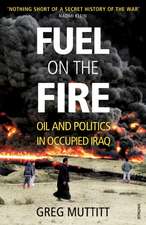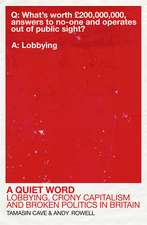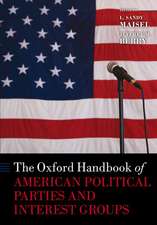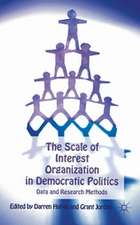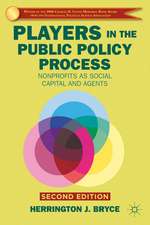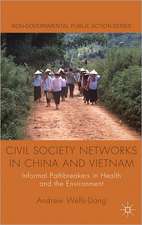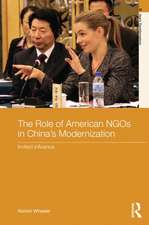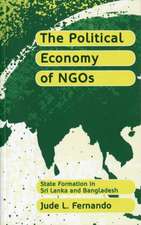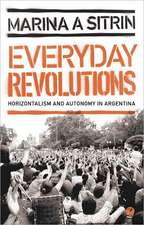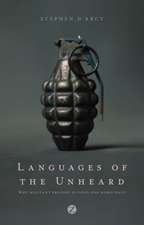The NGO Challenge for International Relations Theory: Global Institutions
Editat de William E. DeMars, Dennis Dijkzeulen Limba Engleză Hardback – 9 mar 2015
Offering a timely reappraisal of NGOs, and a parallel reappraisal of theory in IR—the academic discipline entrusted with revealing and explaining world politics, this book uses practice theory, global governance, and new institutionalism to theorize NGO accountability and analyze the history of NGOs. This study uses evidence from empirical data from Europe, Africa, Latin America, the Middle East and Asia and from studies that range across the issue-areas of peacebuilding, ethnic reconciliation, and labor rights to show IR theory has often prejudged and misread the agency of NGOs.
Drawing together a group of leading international relations theorists, this book explores the frontiers of new research on the role of such forces in world politics and is required reading for students, NGO activists, and policy-makers.
| Toate formatele și edițiile | Preț | Express |
|---|---|---|
| Paperback (1) | 356.45 lei 22-36 zile | +21.82 lei 5-11 zile |
| Taylor & Francis – 19 feb 2015 | 356.45 lei 22-36 zile | +21.82 lei 5-11 zile |
| Hardback (1) | 1004.06 lei 43-57 zile | |
| Taylor & Francis – 9 mar 2015 | 1004.06 lei 43-57 zile |
Din seria Global Institutions
-
 Preț: 286.42 lei
Preț: 286.42 lei -
 Preț: 329.60 lei
Preț: 329.60 lei -
 Preț: 303.16 lei
Preț: 303.16 lei -
 Preț: 279.80 lei
Preț: 279.80 lei -
 Preț: 279.88 lei
Preț: 279.88 lei -
 Preț: 309.04 lei
Preț: 309.04 lei -
 Preț: 326.01 lei
Preț: 326.01 lei -
 Preț: 271.46 lei
Preț: 271.46 lei -
 Preț: 310.65 lei
Preț: 310.65 lei -
 Preț: 301.39 lei
Preț: 301.39 lei -
 Preț: 294.00 lei
Preț: 294.00 lei -
 Preț: 365.03 lei
Preț: 365.03 lei -
 Preț: 299.26 lei
Preț: 299.26 lei -
 Preț: 326.36 lei
Preț: 326.36 lei -
 Preț: 356.45 lei
Preț: 356.45 lei -
 Preț: 188.79 lei
Preț: 188.79 lei -
 Preț: 345.89 lei
Preț: 345.89 lei -
 Preț: 363.25 lei
Preț: 363.25 lei -
 Preț: 363.20 lei
Preț: 363.20 lei - 18%
 Preț: 1001.55 lei
Preț: 1001.55 lei - 26%
 Preț: 761.76 lei
Preț: 761.76 lei - 18%
 Preț: 999.82 lei
Preț: 999.82 lei -
 Preț: 447.90 lei
Preț: 447.90 lei -
 Preț: 384.16 lei
Preț: 384.16 lei -
 Preț: 440.69 lei
Preț: 440.69 lei -
 Preț: 369.18 lei
Preț: 369.18 lei -
 Preț: 368.90 lei
Preț: 368.90 lei -
 Preț: 345.89 lei
Preț: 345.89 lei -
 Preț: 360.10 lei
Preț: 360.10 lei - 18%
 Preț: 998.71 lei
Preț: 998.71 lei - 18%
 Preț: 1113.25 lei
Preț: 1113.25 lei -
 Preț: 358.84 lei
Preț: 358.84 lei - 17%
 Preț: 246.93 lei
Preț: 246.93 lei - 18%
 Preț: 1160.47 lei
Preț: 1160.47 lei - 18%
 Preț: 1052.38 lei
Preț: 1052.38 lei -
 Preț: 381.03 lei
Preț: 381.03 lei -
 Preț: 364.51 lei
Preț: 364.51 lei - 26%
 Preț: 819.48 lei
Preț: 819.48 lei - 18%
 Preț: 1111.51 lei
Preț: 1111.51 lei - 18%
 Preț: 999.46 lei
Preț: 999.46 lei
Preț: 1004.06 lei
Preț vechi: 1224.47 lei
-18% Nou
Puncte Express: 1506
Preț estimativ în valută:
192.12€ • 201.13$ • 158.97£
192.12€ • 201.13$ • 158.97£
Carte tipărită la comandă
Livrare economică 07-21 aprilie
Preluare comenzi: 021 569.72.76
Specificații
ISBN-13: 9781138845299
ISBN-10: 1138845299
Pagini: 358
Ilustrații: 4
Dimensiuni: 138 x 216 x 21 mm
Greutate: 0.56 kg
Ediția:1
Editura: Taylor & Francis
Colecția Routledge
Seria Global Institutions
Locul publicării:Oxford, United Kingdom
ISBN-10: 1138845299
Pagini: 358
Ilustrații: 4
Dimensiuni: 138 x 216 x 21 mm
Greutate: 0.56 kg
Ediția:1
Editura: Taylor & Francis
Colecția Routledge
Seria Global Institutions
Locul publicării:Oxford, United Kingdom
Public țintă
Postgraduate and UndergraduateCuprins
PART 1: Introduction: 1. William E. DeMars and Dennis Dijkzeul – NGOing: Practice, Bridging and Power PART 2: Theory 2. Morten Skumsrud Andersen – How to Study NGOs in Practice: A Relational Approach, 3. Karen A. Mingst and James P. Muldoon, Jr. – Global Governance and NGOs: Reconceptualizing International Relations for the 21st Century, 4. Anna Ohanyan – Network Institutionalism: A New Synthesis for NGO Studies PART 3: Crosscutting Evidence: History, Region, Accountability 5. Bob Reinalda – The Coevolution of Non-Governmental and Intergovernmental Organizations in Historical Perspective, 6. Elizabeth A. Bloodgood – Being an NGO in the OECD, 7. Cristina M. Balboa – The Legitimacy and Accountability of International NGOs PART 4: Case Evidence: NGOs and Networks 8. Shareen Hertel – The Theoretical and Practical Implications of Public/Private Partnerships for Labor Rights Advocacy 9. Patrice C. McMahon – NGOs in Peacebuilding: High Expectations, Mixed Results 10. William E. DeMars – Follow the Partners, 11. Dennis Dijkzeul – Heart of Paradox: War, Rape and NGOs in the DR Congo PART 5: Conclusions and Implications 12. William E. DeMars and Dennis Dijkzeul – Conclusions and Implications: NGO Research and International Relations Theory
Recenzii
NGOs have been challenging international relations theory for some time, and this essential volume clearly articulates the many ways it has. More importantly, it also charts a path for future theorizing.
Michael Barnett, University Professor of International Affairs and Political Science, George Washington University
This new volume on NGOs provides a root and branch critique of how all the major IR theories overlook the politics of NGOs. Redeploying core themes of power and practice, it provides an in-depth understanding of the global order, locating the ‘bridging’ role that NGOs play for many issues and across many societies. The chapters offer new insights into the strategies and impacts of NGOs in international affairs, and the conclusion synthesizes the various ways in which NGOs force radical reorientations of IR theory. This book should be read by any student or scholar of international relations.
Anthony F. Lang, Jr., Chair in International Political Theory and Director of the Centre for Global Constitutionalism, University of St Andrews
"The NGO Challenge for International Relations Theory is an important and thought-provoking book that consolidates multiple perspectives and offers sound and novel advice for NGO researchers. It will primarily interest doctoral students and faculty specializing in NGO studies, as well as IR theorists concerned with ontology, epistemology, and methodology."
George E. Mitchell, The Powell School of the City College of New York
Michael Barnett, University Professor of International Affairs and Political Science, George Washington University
This new volume on NGOs provides a root and branch critique of how all the major IR theories overlook the politics of NGOs. Redeploying core themes of power and practice, it provides an in-depth understanding of the global order, locating the ‘bridging’ role that NGOs play for many issues and across many societies. The chapters offer new insights into the strategies and impacts of NGOs in international affairs, and the conclusion synthesizes the various ways in which NGOs force radical reorientations of IR theory. This book should be read by any student or scholar of international relations.
Anthony F. Lang, Jr., Chair in International Political Theory and Director of the Centre for Global Constitutionalism, University of St Andrews
"The NGO Challenge for International Relations Theory is an important and thought-provoking book that consolidates multiple perspectives and offers sound and novel advice for NGO researchers. It will primarily interest doctoral students and faculty specializing in NGO studies, as well as IR theorists concerned with ontology, epistemology, and methodology."
George E. Mitchell, The Powell School of the City College of New York
Descriere
This book seeks to achieve a dual purpose: to enhance understanding of NGOs by generating better evidence and theory; and to inform and renew IR theory through the challenge of understanding NGOs.
